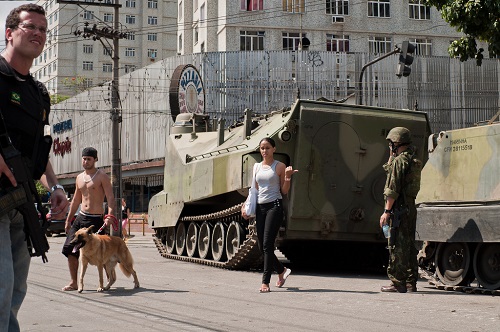Raphael Sanchez photo
By
Ricardo Swire
For the first time since Brazil’s 1988 military dictatorship an Army General will control the internal security of legendary carnival metropolis Rio de Janeiro. Military oversight of the district is active from February 16th 2018 until Monday December 31st 2018. The General who oversaw the 2016 Summer Olympics’ security now controls Rio de Janeiro’s civilian police force, a clear indicator Rio’s flagship security strategy called “Pacification Policing” has failed in its more than one thousand shanty towns.
In 2014 Pacifying Police Unit (UPP) officers were main suspects in the mysterious disappearance of a man from the Rocinha ghetto. Public confidence in the UPP’s strategy deteriorated. Caribbean intelligence notes suggest the police Major commanding six hundred and seventy Pacifying Police Unit officers, assigned to the erupted Rocinha favela, are out-gunned by criminal characters. Absence of frequent police patrols has invited turf wars between the Brazilian Revolutionary Criminal Command (CRBC) and rivals Red Command or PCC.
The Brazilian Federal Police July 2017 arrest of local celebrity drug lord “Cabeca Branca” or “White Head” created a power vacuum in rural districts. Evidence showed White Head spent US$100 million in bribes paid to Brazilian state and public servants working in Mato Grosso, Mato Grosso do Sul, Parana, Santa Catarina, Rio Grande do Sul and Sao Paulo. He bankrolled select support staff employed to the ports of Santos and Itajai for his cocaine shipments’ safe passage.
Brazil’s continuous influx of drugs and upsurge in gang clashes are partially related to secret twenty minute small plane flights from neighbouring Bolivia. Such trips deliver suitcases of cocaine to makeshift airstrips near Brazilian river ports. Caribbean intelligence reports identified Brazilian motorized dug-out canoes that move these drug supplies along the Mamore River bisecting Brazil and Bolivia. Rondonia state in western Brazil only has thirty-five Federal Police officers to safeguard an area with active river ports at one hundred meters intervals.
The Free Trade Zone in Manaus is home to one of Brazil’s busiest commercial ports. As the country’s most prosperous and biggest district, housing almost two million residents, Manaus doubles as a major cocaine transit hub controlled by Family of the North gang or FDN. The criminal syndicate operates from headquarters in northern and western Manaus communities. Cocaine consignments arrive via the Solimoes River then move along the Amazon River to enter Brazil. Rio’s recent extreme security measure capitalizes on the Brazilian military’s large operational capacity and integrated intelligence system.
Rio de Janeiro’s 2018 security operation is the thirteenth occasion Brazil’s government utilized a military option to manage internal security vulnerabilities. The second most densely populated city of six point five million residents is enveloped by violence associated with the Rocinha favela based “Amigos dos Amigos” gang. Rio de Janeiro’s ghettos are mostly bricks and cement homes. Many have water supply and ninety-nine percent are wired with electricity. Sanitation is residents’ main criticality. In the Rocinha favela sewage flows down a large channel and thru some houses. Since September 2017 this Brazilian ghetto has been under siege by drug lords. Nine hundred and fifty soldiers assigned to restore security and safety.
Between February 09th 2018 and February 13th 2018 Federal Police duty rosters reflected names of seventeen thousand officers deployed to secure Rio’s Carnival. Despite heavy police presence the national celebration was marred by barefaced criminal acts. Quite unlike 2017’s event when a Military Police (MP) unit was stationed nearby prior to commencement of festivities and its complement made up twenty percent of Rio’s Carnival security force. During the 2018 Carnival Federal Police intelligence data mapped gangs that assaulted and robbed tourists in Rio de Janeiro districts normally considered safe.
In one Carnival security breach three Federal Police officers were killed and two wounded during a shootout with unidentified criminals. Evidence highlighted several well known samba institutions that paraded Carnival Day openly protesting insecurity and political corruption are themselves accused of dishonesty. The president of “Beija-Flor,” the 2018 Carnival champion, challenges a forty-eight year corruption and racketeering conviction in court. Another high-profile samba institution president is the subject of a money laundering investigation.
Ricardo Swire
Ricardo Swire is the Principal Consultant at R-L-H Security Consultants & Business Support Services and writes on a number of important issues.



No Comments Yet!
You can be first to comment this post!